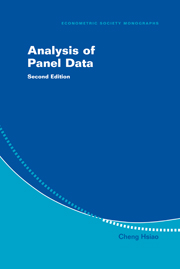Book contents
- Frontmatter
- Contents
- Preface to the Second Edition
- Preface to the First Edition
- Chapter 1 Introduction
- Chapter 2 Analysis of Covariance
- Chapter 3 Simple Regression with Variable Intercepts
- Chapter 4 Dynamic Models with Variable Intercepts
- Chapter 5 Simultaneous-Equations Models
- Chapter 6 Variable-Coefficient Models
- Chapter 7 Discrete Data
- Chapter 8 Truncated and Censored Data
- Chapter 9 Incomplete Panel Data
- Chapter 10 Miscellaneous Topics
- Chapter 11 A Summary View
- Notes
- References
- Author Index
- Subject Index
Chapter 2 - Analysis of Covariance
Published online by Cambridge University Press: 14 May 2010
- Frontmatter
- Contents
- Preface to the Second Edition
- Preface to the First Edition
- Chapter 1 Introduction
- Chapter 2 Analysis of Covariance
- Chapter 3 Simple Regression with Variable Intercepts
- Chapter 4 Dynamic Models with Variable Intercepts
- Chapter 5 Simultaneous-Equations Models
- Chapter 6 Variable-Coefficient Models
- Chapter 7 Discrete Data
- Chapter 8 Truncated and Censored Data
- Chapter 9 Incomplete Panel Data
- Chapter 10 Miscellaneous Topics
- Chapter 11 A Summary View
- Notes
- References
- Author Index
- Subject Index
Summary
INTRODUCTION
Suppose we have sample observations of characteristics of N individuals over T time periods denoted by yit, xkit, i = 1, …, N, t = 1, …, T, k = 1, …, K. Conventionally, observations of y are assumed to be the random outcomes of some experiment with a probability distribution conditional on vectors of the characteristics x and a fixed number of parameters θ, f(y ∣ x, θ). When panel data are used, one of the ultimate goals is to use all available information to make inferences on θ. For instance, a simple model commonly postulated is that y is a linear function of x. Yet to run a least-squares regression with all NT observations, we need to assume that the regression parameters take values common to all cross-sectional units for all time periods. If this assumption is not valid, as shown in Section 1.2, the pooled least-squares estimates may lead to false inferences. Thus, as a first step toward full exploitation of the data, we often test whether or not parameters characterizing the random outcome variable y stay constant across all i and t.
A widely used procedure to identify the source of sample variation is the analysis-of-covariance test. The name “analysis of variance” is often reserved for a particular category of linear hypotheses that stipulate that the expected value of a random variable y depends only on the class (defined by one or more factors) to which the individual considered belongs, but excludes tests relating to regressions.
- Type
- Chapter
- Information
- Analysis of Panel Data , pp. 14 - 26Publisher: Cambridge University PressPrint publication year: 2003



